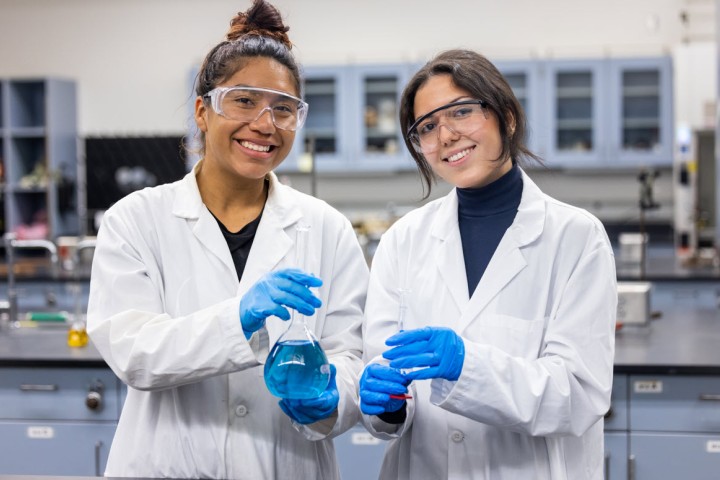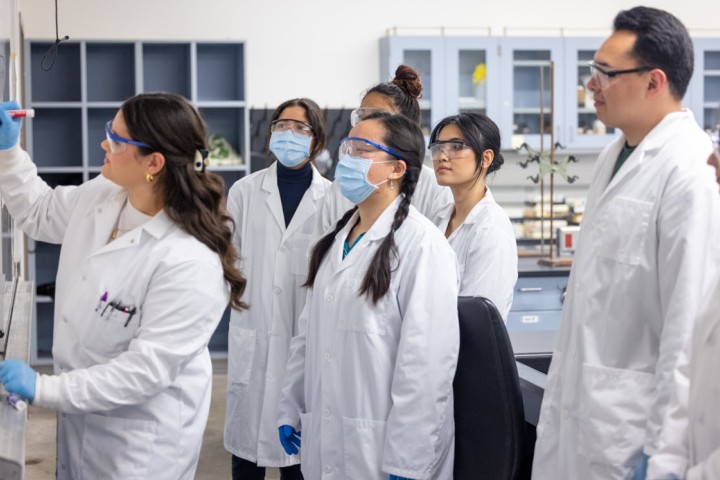The Department of Chemistry and Biochemistry provides students with a broad foundation in all areas of chemistry and advanced specialized training in the options: 1) Physical and Analytical Chemistry , 2) Inorganic and Organic Chemistry, 3) Biochemistry, or 4) Chemical Education, leading to the culminating project of a Thesis or Comprehensive Exam.
From the beginning of their program, graduate students will be immersed and stimulated in student research to identify, investigate, and effectively demonstrate their scientific curiosities. Our faculty provides robust research mentorship using state-of-the-art equipment and facilities, and are additionally supported by external research grants from the NSF, NIH, DEO, and CSUPERB.
Admissions to the program requires a baccaulaureate in chemistry or biochemistry from an accredited college or university or a baccalaureate in a related field with a strong background in chemistry. Applicants interested in the biochemistry option should have a preparation equivalent to that required for the Cal State LA baccalaureate in biochemistry, which includes, among other requirements, 10 semester units of introductory biology and 2 semester units of upper division biology or microbiology.
All applicants are required to have a 2.5 grade point average in their last 60 semester units attempted.
To learn more about graduate student application and admission to Cal State LA, visit Admissions and Recruitment.
Plan ahead by reviewing Fall 2026 Admission Deadlines- Graduates.
- Domestic Application Deadline - applies to U.S. Citizens, U.S. Permanent Residents, Undocumented Students currently in the U.S. (including TPS, DACA, asylum, Special Immigrant Juvenile, etc.), and T and U Visa Holders.
- International Application Deadline - applies to applicants who will require a F-1 Visa or I-20 (Certificate of Eligibility for Nonimmigrant Student Status) to study in the United States.
Join us by submitting an application through Cal State Apply.
Applications for Fall 2026 will open on October 1, 2025 and are due April 15, 2026.
A total of 30-31 units are required for the degree, of which are 16 units for the core requirements and 14-15 units for the option-based requirement with a minimum of 15 units in 5000-level courses. The option-based requirement includes 12-13 units of elective requirements and 2 units of thesis work, or 14-15 units of elective requirements and comprehensive examination. Each student's program is designed with the assistance of a faculty advisor and the student's advisory committee. All students must establish a Thesis or Comprehensive Exam Committee of four faculty members and pass the prospectus.
- All students with Thesis culminating experience must meet the following requirements: submit a thesis approved by the Department of Chemistry and Biochemistry as part of the program, and
- Pass a final oral examination, primarily about the thesis, administered by the department.
All students with Comprehensive Examination cumulating experience must pass comprehensive examinations on the subjects of the required courses.
See Recommended Course Sequence: Master of Science in Chemistry.
Requirements for Option 1: Physical and Analytical Chemistry (30-31 units)
Core Requirements (16 units)
- Core Courses (9 units)
CHEM 5000- Interdisciplinary Discoveries in Chemistry and Biochemistry (3)
CHEM 5100- Introduction to Research (3)
CHEM 5110- Graduate Seminar: Chemistry I (2)
CHEM 5120- Graduate Semianr: Chemistry II (1) - Research Requirements (7 units)
CHEM 5910- Advanced Laboratory (1) (complete 2 units)
CHEM 5970- Graduate Research (1-3) (complete 5 units)
Option Requirements (12-15 units)
- Directed Elective within Option (8-10 units) (NOTE: Comprehensive Exam (CHEM 5960) students select 8 or 9 units. Thesis (CHEM 5990) select 9 or 10 units).
CHEM 4450- Introduction to Atmospheric Chemistry (3)
CHEM 4460- Drug Delivery (3)
CHEM 4510- Advanced Analytical Chemistry: Optical Spectroscopy (2)
CHEM 4520- Advanced Analytical Chemistry: Analytical Separations and Mass Spectroscopy (2)
CHEM 4530- Advanced Analytical Chemistry: Electrochemistry and Surface Techniques (2)
CHEM 5400- Quantum Chemistry (3)
CHEM 5410- Nuclear Magnetic Resonance Spectroscopy (3)
CHEM 5510- Thermodynamics and Kinetics of Materials (3) - Electives outside Option (3 or 6 units)
Select courses from the directed electives in Options II and III. Comprehensive examination students (CHEM 5960) must complete 6 units. Thesis students (CHEM 5990) complete 3 units.
Culminating Experience (0 or 2 units)
- Select one course:
CHEM 5960- Comprehensive Examination (0)
CHEM 5990- Thesis (1-3) (complete 2 units)
Requirements for Option II: Inorganic and Organic Chemistry (30-31 units)
Core Requirements (16 units)
- Core Courses (9 units)
CHEM 5000- Interdisciplinary Discoveries in Chemistry and Biochemistry (3)
CHEM 5100- Introduction to Research (3)
CHEM 5110- Graduate Seminar: Chemistry I (2)
CHEM 5120- Graduate Seminar: Chemistry II (1) - Research Requirements (7 units)
CHEM 5910- Advanced Laboratory (1) (complete 2 units)
CHEM 5970- Graduate Research (1-3) (complete 5 units)
Option Requirements (12-15 units)
- Directed Elective within Option (9 units)
CHEM 4200- Advanced Organic Chemistry I (3)
CHEM 4210- Polymer Chemistry (3)
CHEM 4840- Drug Discovery and Development (3)
CHEM 4850- Bioinorganic and Bioorganic Chemistry (3)
CHEM 5200- Synthetic Organic Chemistry: Analysis, Design, and Methodology (3)
CHEM 5210- Organic Structure Determination (3)
CHEM 5600- Advanced Inorganic Chemistry (3) - Electives outside Option (3 or 6 units)
Select courses from the directed electives in Options I and III. Comprehensive Exam (CHEM 5960) students must complete 6 units. Thesis (CHEM 5990) students complete 3 units.
Culminating Experience (0 or 2 units)
- Select one course:
CHEM 5960- Comprehensive Examination (0 units)
CHEM 5990- Thesis (1-3) (complete 2 units)
Requirements for Option in Biochemistry (30-31 units):
Core Requirements (16 units)
- Core Courses (9 units)
CHEM 5000- Interdisciplinary Discoveries in Chemistry and Biochemistry (3)
CHEM 5100- Introduction to Research (3)
CHEM 5110- Graduate Seminar: Chemistry I (2)
CHEM 5120- Graduate Seminar: Chemistry II (1) - Research Requirements (7 units)
CHEM 5910- Advanced Laboratory (1) (complete 2 units)
CHEM 5970- Graduate Research (1-3) (complete 5 units)
Option Requirements (12-15 units)
- Directed Elective within Option (9 units)
CHEM 4860- Bioinformatics (3)
CHEM 5320- Protein Structure (3)
CHEM 5330- Transcriptional Control of Gene Expression (3)
CHEM 5340- Signal Transduction (3)
CHEM 5350- RNA Structure and Function (3)
CHEM 5360- Post-translational Modifications of Proteins - Electives outside Option (3 or 6 units)
Select courses from the directed electives in Option I and II. Comprehensive Exam (CHEM 5960) students must complete 6 units. Thesis (CHEM 5990) students complete 3 units.
Culminating Experience (0 or 2 units)
- Select one course:
CHEM 5960- Comprehensive Examination (0)
CHEM 5990- Thesis (1-3) (complete 2 units)
Requirements for Option IV: Chemical Education (30-31 units):
Core Requirements (16 units)
- Core Courses (9 units)
CHEM 5000- Interdisciplinary Discoveries in Chemistry and Biochemistry (3)
CHEM 5100- Introduction to Research (3)
CHEM 5110- Graduate Seminar: Chemistry I (2)
CHEM 5120- Graduate Seminar: Chemistry II (1) - Research Requirements (7 units)
CHEM 5910- Advanced Laboratory (1) (complete 2 units)
CHEM 5970- Graduate Research (1-3) (complete 5 units)
Option requirements (12-15 units)
- Directed Elective from Options (9 units)
Select the directed elective courses from either Option I, II, or III. Comprehensive Exam (CHEM 5960) students select 8 or 9 units of directed elective courses within Option I, II, or III.
Thesis (CHEM 5990) students select 9 or 10 units of directed elective courses within Option I, II, or III. Electives outside option (3 or 6 units). - Electives outside Department (3 or 6 units)
With approval from the principal graduate advisor, select 4000-5000 level courses offered by the Department of Psychology, Department of Sociology, or the Charter College of Education. Selected courses should focus on topics pertinent to education theory, curriculum design, and assessment, or education research methods.
Thesis (CHEM 5990) students complete 3 units.
Culminating Experience (0 or 2 units)
- Select one course:
CHEM 5960- Comprehensive Examination (0)
CHEM 5990- Thesis (1-3) (complete 2 units)
Graduate Thesis, Project, and Dissertation Guidelines as provided by the Graduate Resource Center
Typical Course Offerings (updated March 2024)
Graduate Program Learning Outcomes
Students seeking a Master of Science in Chemistry will apply and integrate foundational knowledge and critical thinking skills to identify and solve scientific problems. Students will develop the ability to become contributing members of the scientific community, both as individuals and while working in teams, and will develop creativity to generate solutions to societal needs.
Students will be prepared to enter careers in chemical, materials science, pharmaceutical, biochemical, and molecular life sciences industries; careers in government, education, and academic laboratories to pursue advanced education in graduate and professional school.
Specifically, graduates of the MS in Chemistry program will:
I. Demonstrate the ability to use scientific processes to identify and address complex scientific problems by specializing in a particular area or sub-field of modern chemistry and/or biochemistry:
- identify complex scientific problems by searching, reviewing, and critiquing the scientific literature
- construct and evaluate scientific questions and hypotheses
- design methods, including the use of appropriate equipment, instrumentation, and computer software for investigating scientific questions and hypotheses
- recognize limitations of experimental methodologies
II. Demonstrate the ability to investigate complex scientific problems using experimental and theoretical methodologies:
- conduct experiments including manipulating, synthesizing, and analyzing molecules and their properties using contemporary laboratory equipment and methods
- conduct quantitative and qualitative measurements and record data
- apply concepts of approximation, estimation, precision, and accuracy in data acquisition and problem solving
- quantitatively analyze data, evaluate the validity of data, and extrapolate meaning from data to generate scientific results
- conclude based upon evidence supported by results
- practice model ethical behavior intrinsic to the scientific process of knowledge generation
- practice safe handling of equipment, molecules, and organisms
III. Demonstrate the ability to effectively communicate science:
- employ technical and ethical conventions for written and oral reports including the ability to locate and evaluate sources
- report findings within the context of current scientific knowledge by locating, retrieving, understanding, evaluating, and citing relevant scientific literature
- demonstrate familiarity and practice with the process of working in teams and peer evaluation
- conclude clear and reasoned findings supported by evidence
- recognize when additional sources are needed for conclusive statements
Advising
For questions regarding the Chemistry and Biochemistry M.S. program, please contact Dr. Krishna Foster.
Chemistry and Biochemistry student majors are advised through the NSS Academic Advisement Center. The NSS Advisement Center provides guidance on course selection, career planning, navigating university resources, and assisting students achieve their academic and professional goals. Please visit the link to schedule an appointment.
Research and funding

Learn more about Graduate Assistant for Chemistry and Biochemistry positions.
The Office of Graduate Studies offers support toward a graduate student's completion of thesis, creative activitiess, or dissertation; graduate equity fellowship program; graduate student non-resident tuition waiver program; travel support for conferences and professional development, and more! Learn more by visiting Student Support Programs and Funding Opportunities.
Cal State LA and Molecular Software Sciences Institute (MolSSI) at Virginia Tech collaborate to incorporate machine learning techniques in molecular simulatioin research and develop pedagogical materials in computational science. Cal State LA undergraduate and graduate students participate in year-round mentored research and attend annual MolSSI workshop. Read more and apply at Cal State LA- MolSSI Prec.
The Bridge to the Doctorate at Cal State LA Program will increase the number of traditionally underrepresented doctoral-level scientists engaged in biomedical research to enhance the health of the U.S. Public. For more information, including program application, please contact Dr. Robert Vellanoweth at [email protected] or Dr. Michael Hayes at [email protected] or visit Bridges to the Doctorate Program at Cal State LA.
For additional information about research and funding opportunities, visit Awards and Scholarship, Student Resources, Student Research and Facilities, and Cal State LA's Financial Aid and Scholarships.
Seminar Series

Join the department's Graduate Seminar Series on Tuesdays, 12 pm at Salazar Hall 136, to learn more about advances in research within the molecular sciences.
Seminars are presented by graduate students and guest speakers who share their research within the chemistry and biochemistry fields. See the Graduate Seminar Schedule.